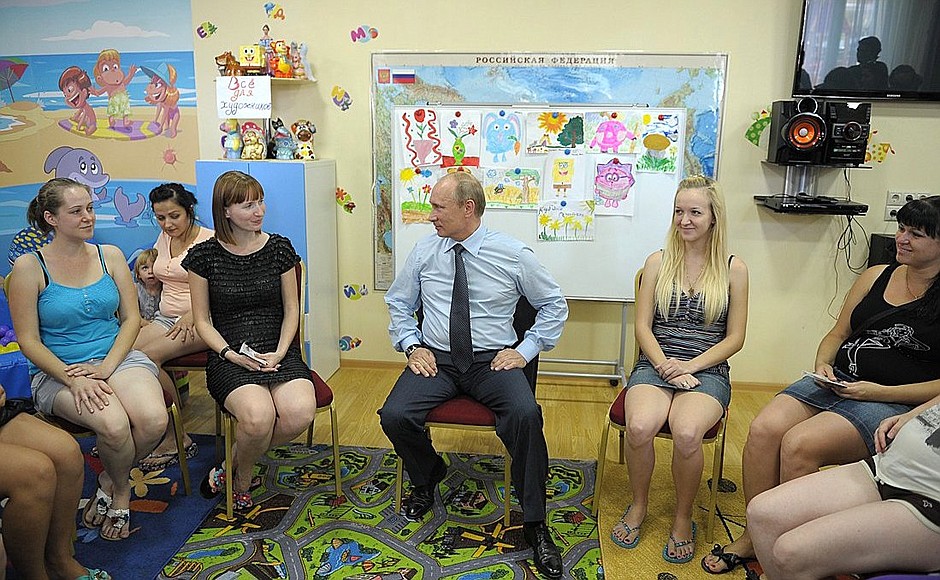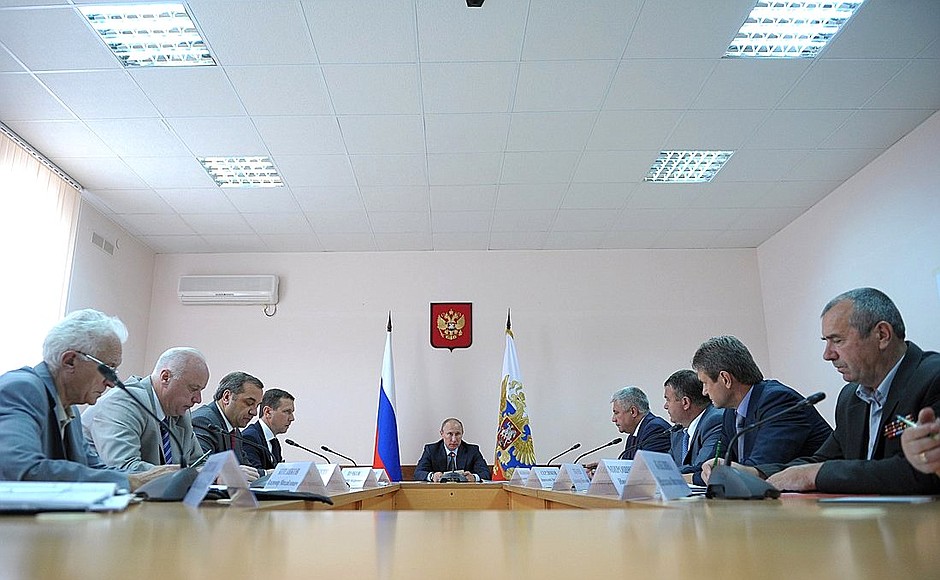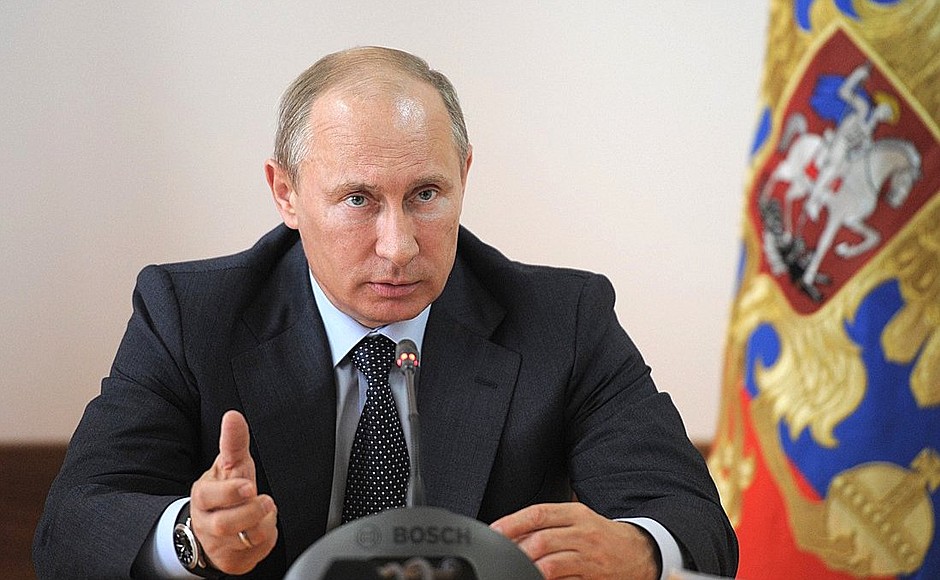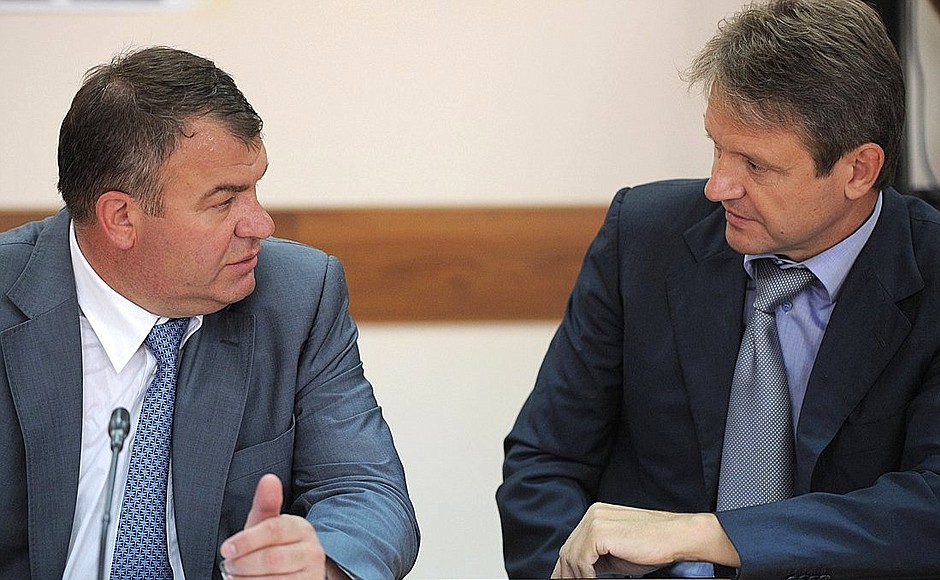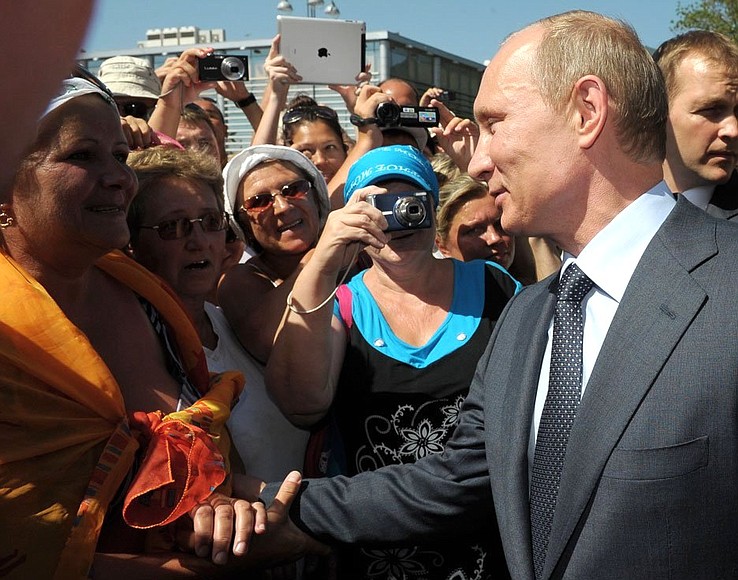Before the meeting, Mr Putin met with women evacuated from the emergency zone.
Later, the President spoke with Gelendzhik residents and holidaymakers.
Vladimir Putin is personally monitoring the rebuilding works and provision of aid to the flood victims. This was Mr Putin’s third trip to the flood-affected regions.
* * *
President of Russia Vladimir Putin: Good afternoon, colleagues.
We are meeting today in Gelendzhik, which was also hit by the recent floods, and sadly, there were victims here too.
Today, we will discuss the work done so far to implement the Presidential Executive Order of July 17 on disaster relief following this tragedy. We will examine all of the different aspects and hear from the ministry and agency heads and the regional authorities. I have also asked representatives of the public oversight committee to take part. You are influential and well-known figures in the region, all the more so in Krymsk, and you have the public’s trust, and so I would like to hear your views too on how the disaster relief work is going.
See also
I stress that I want to hear reports on all aspects of our work, above all on the financial compensation for flood victims. We agreed that the families of people killed would receive 2 million rubles each by July 23 at the latest. I want to hear on the situation with these compensation payments. The same goes for compensations for partial loss of property, which we agreed would total up to 160,000 rubles for each member of the affected families.
I note in this respect that the federal budget has allocated 1.7 billion rubles for these purposes. We also need to examine the situation with people who were permanently resident in the region but were not properly registered. Of course, the fact that they were not registered is not very good, but we must not act as if this tragedy did not affect these people too. The compensation and support that we agreed on must apply fully to them as well.
True, I do want to make it clear to all of the officials, including the judicial officials, that we must prevent any possible abuses here, no matter by whom. No one has the right to profit from this common tragedy, and so the money must go only to those who are entitled to it.
I want to hear also on the work to help the elderly, people with disabilities, and pregnant women. We just visited a centre here in Gelendzhik, to which pregnant women due to give birth have been transferred from Krymsk.
There are the other groups I just mentioned too: elderly people, people with disabilities, children. I spoke with the Healthcare Minister yesterday. The Chairman of the Government Commission, Oleg Govorun, should have all the information. I ask you to give us a detailed briefing now on the work with these groups.
Regarding the rebuilding works in the flood-affected districts, we agreed that Krasnodar Territory authorities, together with the federal authorities, would have a programme ready by August 1 for resettling people from the flooded areas to safer sites. These sites need to be selected and a work schedule needs to be drafted so that the money we have allocated for capital repairs – 5,000 rubles per square metre – and the money we will make available for new construction is spent with best result, rapidly, and effectively. The objective is to have people able to move into new apartments and houses by November 15 at the latest. Capital repairs must be completed by this time. Of course, there are people, especially elderly people living on their own, or people with disabilities, who cannot organise this work independently, and so the local and regional authorities must help these people to organise repair work if they are entitled to such repairs rather than moving into new housing.
In this respect, let me say that all procedures related not just to making the needed funds available, but also to bringing in the construction companies, must be carried out swiftly. Everything must be in accordance with the law, but rapid. The law makes this possible. I expect to hear proposals from the governor. The federal authorities are ready to make the needed decisions quickly. You know what kinds of administrative procedures I am talking about. Do not delay with your proposals so that we can get the work started as soon as possible.
Of course, I expect you to keep close watch on the situation so as to ensure that the construction companies taking part in this work make normal earnings out of it, certainly, but within reasonable bounds, because no one should profit from common tragedy.
Another very important issue is that of rebuilding the social infrastructure – kindergartens, schools, medical centres, and hospitals. I know that there are cases of damaged social infrastructure, and these establishments must be rebuilt as soon as possible. Let’s not forget that children will be going back to school on September 1, and so schools must be fit for use again as soon as possible.
The next issue is that, as you know, during my second visit to Krymsk, many people came up to draw my attention to the fact that small and medium-sized businesses have suffered and people have lost not just their homes and property, but also their livelihood. We took the decision to support these small businesses. Total support for this purpose should come to at least half a billion rubles, and this money should be used to subsidise interest rates on loans and to grant new subsidies. We need to help people to rebuild their businesses and create new jobs for their own neighbours and fellow people living in these districts. We need to get all of the formalities sorted out as quickly as possible and help people to get back on their feet.
Of course, there is another very important issue that concerns the causes of this disaster. Obviously, we cannot prevent big natural disasters of this kind, floods, earthquakes and the like. Nature is stronger than we are. Natural disasters can be very serious, and more often than not we are unable to prevent them, but we are able to predict them, and we certainly have a duty to do everything we can to reduce possible consequences of such disasters to a minimum. You are fully aware of what I am talking about.
First of all, we must organise a proper forecasting system. Such a system operates quite well in some parts of the country, I am thinking of the recent events in the Far East, for example. After the earthquake monitoring system was organised there the relevant services respond quite rapidly to events. This kind of system must be established throughout the country, including here in the south.
Southern Russia has been hit by these sorts of disasters before, not of this scale it is true, but we know nonetheless that this is quite a high-risk zone. I do not see the evidence that timely and necessary measures were taken to warn people and minimise the disaster impact. Of course, we need to understand too, which factors led to flooding on such a large scale.
I have asked Academician Vladimir Kotlyakov, director of the Institute of Geography of the Russian Academy of Sciences and honorary president of the Russian Geographic Society, to take part in our work today.
I read your report and studied the photos attached. Immediately following the floods, a group of specialists carried out very serious work using the Russian orbital segment of the International Space Station, and this produced a large number of photos that were then decoded and analysed. Mr Kotlyakov can now present his conclusions on the results of this work. I read the conclusions, and they seem very well substantiated. The satellite images show very clearly the water’s movement and where it stopped, where such a large quantity of water came from into the town, and how the situation developed. Mr Kotlyakov, I ask you to tell us in detail about this.
The next important issue is that of warning the public. There have been a lot of voices lately saying that our legislative base in this area is insufficiently developed. I do not agree. The 1994 law and the government regulation of 2003 set out in detail the duties of various officials at different levels. It is not an issue of problems with or a lack of laws in this area, it’s about negligence on the part of the officials responsible for enforcing these laws and regulations.
I ask Chairman of the Investigative Committee Alexander Bastrykin to present the investigation’s preliminary results. Let me say right here and now that only the courts can make the final conclusions on who is guilty and of what, and all those suspected or accused of breaching any laws are considered innocent until the court passes its verdict. I therefore ask you to be very careful here, but at the same time to investigate very thoroughly all of the reasons for what happened, and give a legal assessment of the actions taken by various officials. This must not under any circumstance be used as an opportunity for campaigns of any kind. We do not need scapegoats; we need an objective picture.
Let’s begin work. We will start with the report by Regional Development Minister and Chairman of the Government Commission Oleg Govorun, on the issues concerning the government agencies: financial compensation and payments, allocation of relevant resources, what has been allocated, how much money, where these funds are now, whether or not they have reached the regional and municipal authorities, what has reached the citizens themselves, and what is being done to help people who, in order to return to normal, need to leave the affected areas. I am thinking here of small children, pregnant women, the elderly, people with disabilities – people who need our moral and physical support. Also, what is being done regarding preparations for house-building and carrying out repairs and so on? In other words, I want to hear about the whole range of issues.
The floor is yours, Mr Govorun.
<…>
